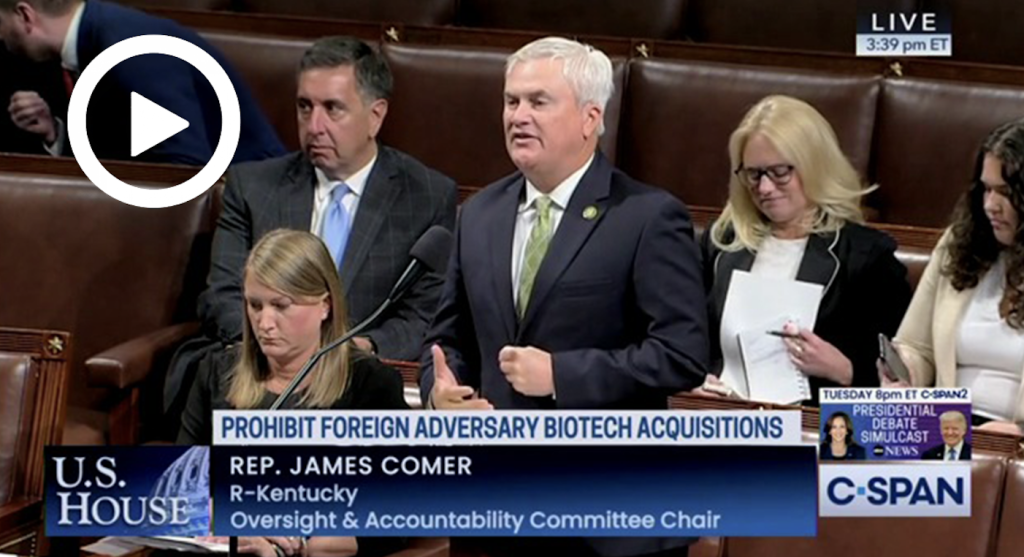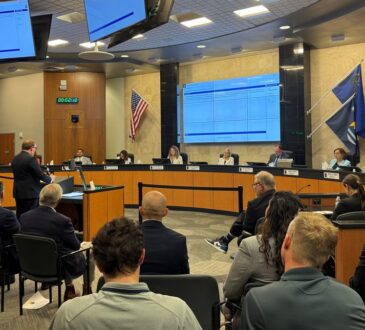
WASHINGTON—Today, House Committee on Oversight and Accountability Chairman James Comer (R-Ky.) delivered remarks on the House floor in support of H.R. 8333, the BIOSECURE Act, introduced by Reps. Brad Wenstrup (R-Ohio) and Raja Krishnamoorthi (D-Ill.). The bipartisan, bicameral bill prohibits U.S. taxpayer dollars from flowing to biotechnology companies that are owned, operated, or controlled by China or other foreign adversaries and specifically names five companies with extensive ties to the Chinese Communist Party. The legislation also prevents federal agencies from procuring any biotechnology equipment or service from such companies.
Below are Chairman Comer’s remarks as prepared for delivery.
Thank you, Mr. Speaker.
I am happy to support H.R. 8333, the BIOSECURE Act.
This bipartisan, bicameral bill prevents U.S. taxpayer dollars from flowing to biotechnology companies that are owned, operated, or controlled by China or other foreign adversaries.
Specifically, this bill names five genomic companies with direct ties to the Chinese Communist Party as biotechnology companies of concern.
The bill then prohibits a federal agency from procuring any biotechnology equipment or service from such companies.
The bill also prohibits federal loan or grant dollars from being used to procure, obtain, or use biotechnology equipment or services from such companies.
The companies named in this legislation create significant risks to U.S. national security.
BGI—one of the named entities—is a CCP biotechnology company and is the world’s largest collector of genetic data.
BGI—alongside its subsidiaries, which are also named in the bill—have been found to conduct research alongside the Chinese military.
WuXi—through its two subsidiaries named in the bill—operates genetic testing centers established in coordination with the CCP, helps carry out research to promote the Chinese-military, and has reportedly stolen U.S. firms’ intellectual property.
The House Oversight Committee has worked hard with outside stakeholders and other Committees of jurisdiction to ensure these national security risks are meaningfully addressed without disrupting medical and pharmaceutical supply chains.
Existing contracts are exempt from the prohibitions in the bill until January 2032 and the bill includes a targeted waiver and exception process.
The bill also exempts biotechnology equipment and services from the bill’s prohibitions that were, but are no longer, produced or provided by a company of concern.
This bill is a necessary step toward protecting American’s sensitive healthcare data from the CCP before these companies become more embedded in the U.S. economy, University systems, and federal contracting base.
I want to thank the bill’s sponsor, Rep. Brad Wenstrup, Chairman of the Select Subcommittee on the Coronavirus Pandemic, for his efforts in ensuring this bill continues to advance.
I also want to thank the Select Committee on the Chinese Communist Party Chairman John Moolenar and Ranking Member Raja Krishnamoorthi, both original cosponsors, as well as the House Oversight Committee’s Ranking Member Jamie Raskin and the Senate Homeland Security Committee Chairman Gary Peters, and their staff, for their hard work on this legislation over the past year.
I urge all of my House Oversight colleagues to support this critical national security bill.I reserve the balance of my time.





